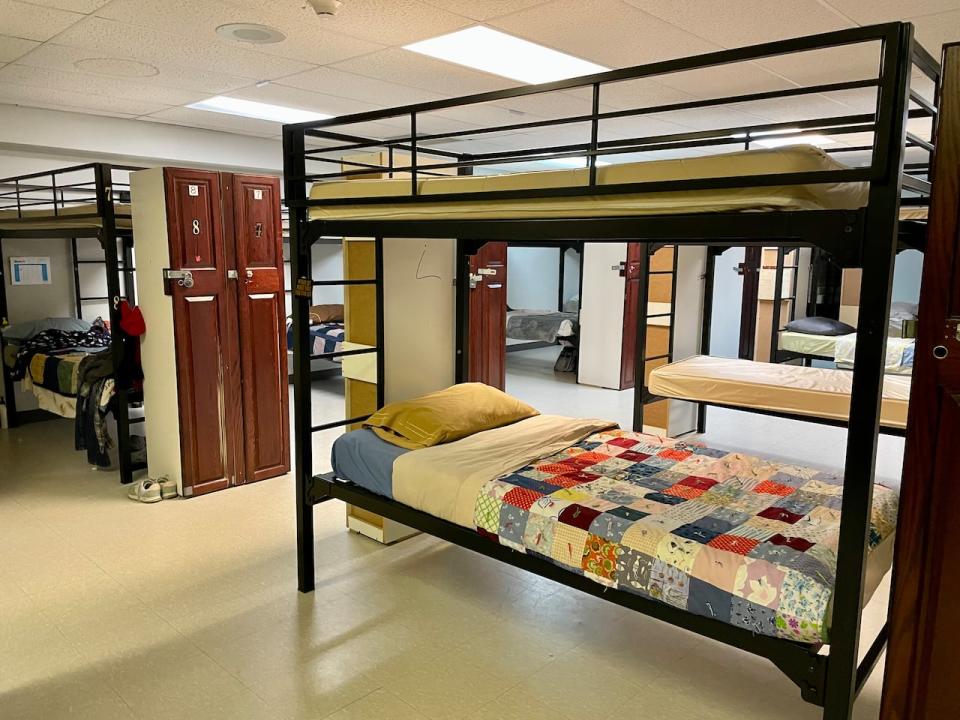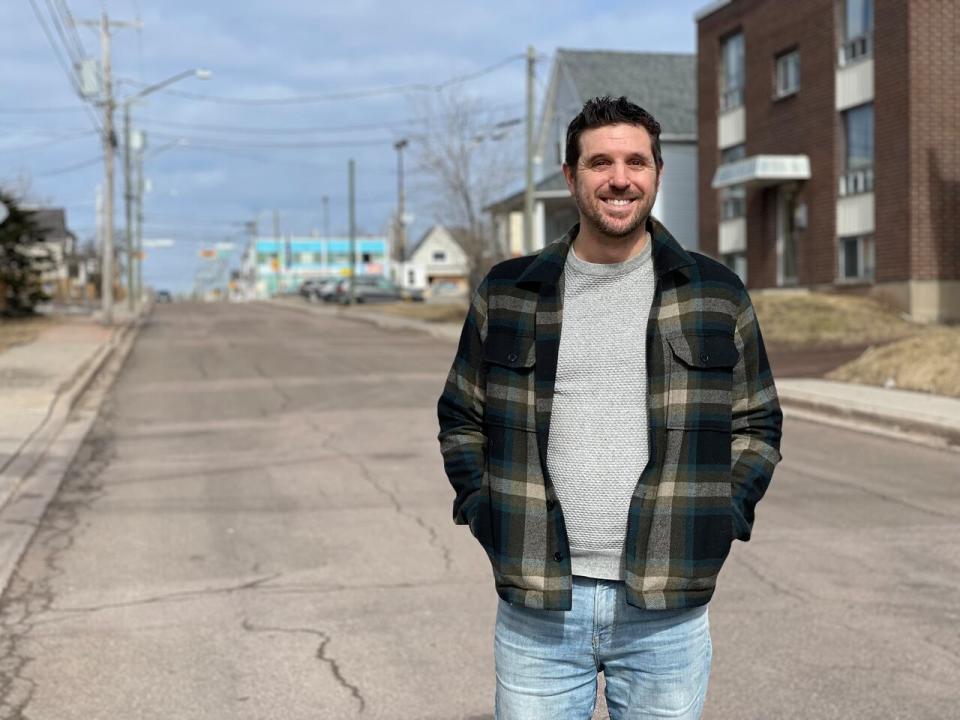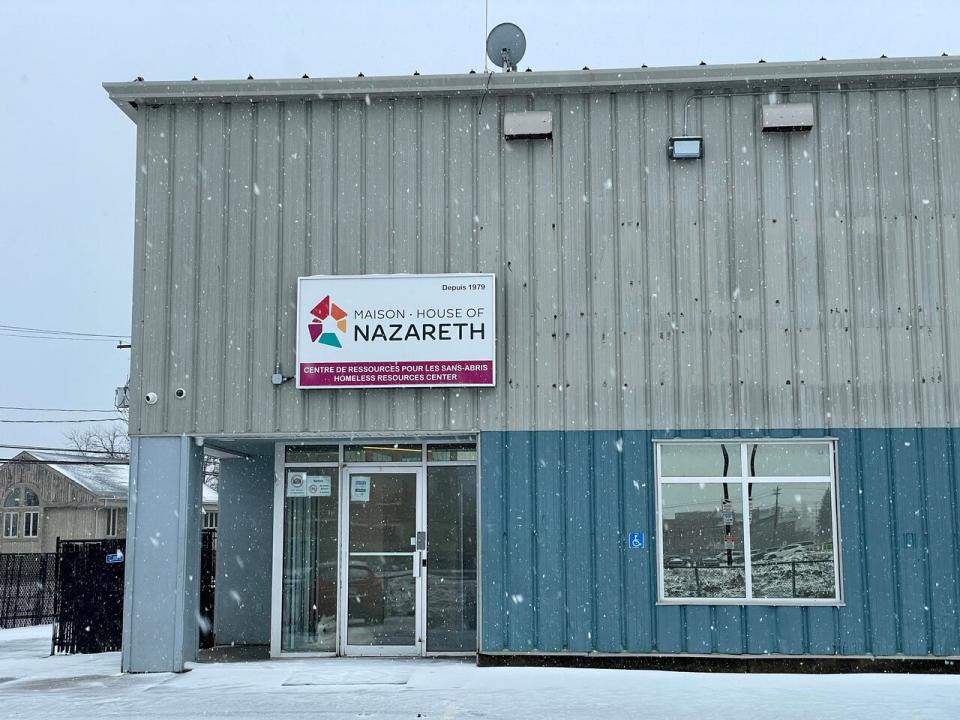Moncton's largest homeless shelter reduces beds, rethinks approach

The new sign hanging outside the House of Nazareth no longer calls it a shelter.
Instead, it tells people walking through the doors they are entering a "resource centre" for the homeless.
"We are not only providing essential services, such as a bed and meals and showers — but more than that, we are providing housing-focused programs to help people move forward," said Zineb Elouad, the charity's executive director.
House of Nazareth opened at the end of 2019 on Albert Street in Moncton with 120 beds — and there were problems from the beginning. Complaints from neighbours about crime and open drug use led to an audit by the province that found problems with the shelter's policies and financial management.
In 2021, the charity's previous executive director, who had promised to "put an end to homelessness," stepped down, and the board was replaced.
The City of Moncton has been withholding thousands of dollars in grant funding from the House of Nazareth since 2021 over concerns about how the shelter is run.
Shelters should be temporary
The move to a housing-focused approach was recommended by OrgCode Consulting, a company from Ontario that helps non-profits and governments reduce and prevent homelessness.
Elouad said the new approach starts from the first contact someone has with the shelter. Staff are now spending their time helping people to find homes, rather than responding to crises and emergencies.
WATCH:
Case managers try to prevent people from spending even one night at the shelter. They work with individuals to find an alternative, safe solution such as staying with a family member.
"We have seen a huge decrease in the length of stay of individuals seeking shelter," Elouad said.
In 2023, the House of Nazareth supported about 600 individuals. Elouad said about 150 — or 25 per cent — were diverted from the shelter to stay with family or friends, or found housing.

When House of Nazareth opened at the Albert Street location it had 120 beds. The size of the shelter quickly proved problematic and prompted complaints from neighbours. (Alexandre Silberman/CBC)
She has also seen a change in the mindset of clients.
"They were lost when they'd come to the shelter. For them, it's a destination, it's a place for me to stay, it's my house. But with the housing-focused approach, we told them, 'No, we're here to help you get your own space, your own housing,'" she said.
In fact, if clients are not willing to work with a case manager to find a home of their own, Elouad said they're asked to leave.
Calmer surroundings
Elouad said the new approach has also helped to solve problems in the Albert Street neighbourhood.
Justin Allain owns Working Class Menswear & Skateboard Shop, two blocks away from the House of Nazareth on Waterloo Street. He sometimes finds people sleeping rough in his front doorway, but unlike other businesses, his store has had few serious issues.

Justin Allain, owner of Working Class Menswear & Skateboard Shop, is just two blocks from House of Nazareth. He has seen a positive change in the neighbourhood since the shelter cut back the number of beds and began focusing on moving people into housing. (Alexandre Silberman)
"Sometimes unhoused people come through and we just talk to them and hear them out," he said. "It seems like the relationship that we've built may have helped us in the situation — of not getting stolen from or vandalized."
Allain said visible homelessness in the area, like people pushing shopping carts and using drugs out in the open, seems to have "mellowed out" since last summer — when the shelter scaled down in size.
"For me, I feel like it's just growing pains of a city that's growing, and that's how I've looked at it from the start," he said.
'It's different for every person'
The move toward housing-focused shelters has been happening across Canada in recent years.
Harvest House, which operates an emergency shelter along with recovery programs, changed its approach just before the pandemic began.
Executive director Marc Belliveau said before the switch, people were sleeping in the dorms for years and had become "stuck" without any hope of moving on.
"People would come in and they would have a bed, and there really wouldn't be a lot of case plans to say, 'How do we get you out of this environment?'" he said.

Marc Belliveau, co-chair of Moncton's Homelessness Steering Committee and executive director of Harvest House, believes a housing-focused approach is even more critical as the number of people experiencing chronic homelessness continues to rise. (Alexandre Silberman/CBC)
Under the new approach, case workers immediately meet with clients to come up with an individual housing plan and to identify ways to get around any barriers. Those can range from getting their identification, to mental health and addictions support.
Belliveau, who also co-chairs the Greater Moncton Steering Committee on Homelessness, said the shelter now sees many people for short stays of three to six months before they transition into housing.
"Our entire focus from the moment people step in our door — we're talking to them about housing," he said. "It's not easy. It's different for every person. And we also have to understand that not everybody will be housed as quickly as we'd like."
In 2023, Harvest House worked with 761 people. The non-profit was able to divert 65 individuals from the shelter to their families or home communities with support, 31 went into detox or recovery programs, and 60 people found housing. About 20 per cent of the individuals who arrived looking for help were able to move on.
Belliveau said there is growing pressure to get people out of chronic homelessness and into housing, as the number of people experiencing homelessness continues to grow.
Moncton's latest point-in-time count — a snapshot of the homeless population — reported nearly 400 people experiencing absolute homelessness in the city.

House of Nazareth is seeing people stay for shorter lengths of time before moving on to permanent housing or treatment programs. (Alexandre Silberman/CBC)
Elouad said the House of Nazareth continues to explain the new approach to clients, always looking for ways to share the message that the shelter is a temporary stopping point and not a permanent place to stay.
"The more we have people housed, the more they can focus on their health, the more we help them keep their permanent housing," she said.

